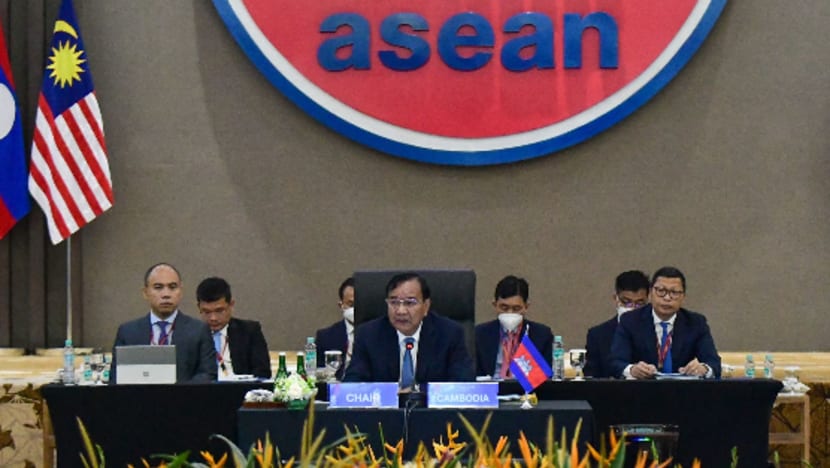Myanmar spiralling into isolation amid unwillingness to meet peace efforts, say analysts
ASEAN foreign ministers on Thursday wrapped up a special meeting on Myanmar in Jakarta, where they expressed concern and disappointment over the lack of significant progress in the peace process.

Cambodia's Foreign Minister Prak Sokhonn attends the Special ASEAN Foreign Ministers' Meeting (SAFMM) in Jakarta on Oct 27, 2022. (Photo: AFP/Handout/ASEAN)
Myanmar is spiralling into absolute financial and political isolation, warned experts, after the nation’s military leaders told its Southeast Asian neighbours to stay out of its affairs following a meeting to discuss a stalled peace plan.
Members of the Association of Southeast Asian Nations (ASEAN) are losing patience with the military government’s reluctance to honour its commitments and push forward with peace talks, associate professor Simon Tay told CNA’s Asia First on Friday (Oct 28).
"If one has seen some positive steps forward then I think one could be patient. Instead, we've seen more instability than any real effort to build a dialogue within the country," said Assoc Prof Tay, who is chairman of think tank Singapore Institute of International Affairs.
"This continued violence, this spiral downwards is also having a huge economic impact. This country is playing itself into absolute financial and political isolation," he added.
ASEAN foreign ministers on Thursday (Oct 27) wrapped up a special meeting on Myanmar in Jakarta, where they expressed concern and disappointment over the lack of significant progress in the peace process.
However, the bloc said it is now "even more determined" to resolve the political crisis in the country.
During the talks, ASEAN chair Cambodia described the situation as "deteriorating and worsening", and emphasised the need for time-bound actions within the Five-Point Consensus, a peace plan adopted in April last year with Myanmar’s military chief Min Aung Hlaing.
In response, Myanmar’s military government warned of "negative implications" if additional pressure was imposed to fulfill the plan.
Continued unwillingness to work with the bloc could cause further consequences, said Assoc Prof Tay, adding "it’s not a question of whether ASEAN suspends or expels Myanmar, it’s kind of marching off into its own corner, putting itself into a real position of difficulty."
GROUPS CALL FOR EXPULSION
Rights groups and activists have urged ASEAN to consider Myanmar’s expulsion from the bloc, over escalating violence and rights abuses by authorities.
The country has seen a spike in bloodshed in recent weeks. Last Sunday, the army, known as the Tatmadaw, launched air attacks against civilians celebrating the anniversary of an ethnic organisation in Kachin State, killing at least 70 people, local media reported.
Expelling Myanmar might be impractical and counterproductive, however, as that would discourage dialogue with the military leaders, said Assoc Prof Tay.
"You can't do anything (in Myanmar), including humanitarian aid, without some degree of access and working relationship with the military," he said. "You do have to find some channel to talk to the generals. That’s the heart of diplomacy and dialogue, the heart of all relations."
Indonesia and Cambodia have said that expulsion was not discussed at the meeting.
Myanmar is already facing restrictions within ASEAN, with its generals barred from high-level meetings since last year. The country was invited to send a non-political official to the special meeting on Thursday but the junta refused.
Malaysia's foreign minister Saifuddin Abdullah said he is pushing for Myanmar to be excluded and suspended from all ASEAN meetings if no progress is made.
SPECIAL ENVOY POSTPONES THIRD VISIT
ASEAN Special Envoy Prak Sokhonn – who is also Cambodian deputy prime minister and foreign affairs minister – told CNA his third visit to Myanmar would now take place after the ASEAN Summit in November.
Mr Sokhonn had earlier said the third visit would be scheduled before the summit, but that commitment was made before the Myanmar military executed four political prisoners in July – a move which angered the international community, including current ASEAN chairman Hun Sen.
Mr Hun Sen had warned the Myanmar military during the ASEAN Foreign Ministers’ Meeting in Phnom Penh that the bloc would have to "rethink" its approach to Myanmar if more political executions were carried out.
The bloc also issued a communique during the meeting that effectively gave the Myanmar army up to November to show progress made on the agreed peace plan.
The communique cited Article 20 of the ASEAN Charter, which allows leaders to make decisions at the summit level without a consensus.
GROWING PRESSURE ON ASEAN
The US earlier called for strong action coming out of the Jakarta meeting.
Advocacy group Human Rights Watch slammed the two-page statement issued by ASEAN Chair Cambodia following the talks, viewing it as a failure by the bloc to act on Myanmar.
Assoc Prof Tay said the United Nations and other major world powers will likely continue to put pressure on ASEAN to force Myanmar to show progress.
However, he said that the situation in Myanmar is too difficult for ASEAN to deal with alone, calling it a “global failure” if powerful nations, particularly those in Asia, do not band together to press the military junta for progress.
While major powers like the US could have more influence or capacity in dialogues with Myanmar, the military junta has a history of not responding well to sanctions, Emeritus Professor Damien Kingsbury told CNA's Asia First on Thursday.
"It’s important to note that the Myanmar military has not ever responded to the external pressure favourably and it does have the very solid backing of China, which means it is largely immune to foreign pressure," said the emeritus professor from Deakin University’s school of humanities and social sciences.
BLEAK OUTLOOK
Following the meeting, ASEAN foreign ministers will now submit proposals for the bloc's leaders to decide their next steps on Myanmar at the ASEAN Summit in Cambodia next month.
Leaders will assess Myanmar's progress and possibly decide on measures against the country without a consensus.
However, Emeritus Professor Kingsbury painted a bleak picture going forward, stating: "I don't see Myanmar going back to any sort of democratic process any time soon."
A general election, expected to be held next year, will undoubtedly produce a preordained result, he said. The National League for Democracy (NLD), led by Nobel laureate Aung San Suu Kyi, will likely be barred from standing, he added.
"Realistically, if we want to see the Tatmadaw pushed from power, it’s only going to be by arming the separatist groups or the pro-democratic groups in the country," said Emeritus Professor Kingsbury.
Assoc Prof Tay added that conditions need to be set for dialogue, with compromise from various parties to forward the peace process.
"It must go back to an effort diplomatically using sanctions as well as incentives to create the conditions for an internal dialogue, and hope the outside world and the inside leaders see the need for some sort of compromise for the betterment of the people of Myanmar," he said.
















